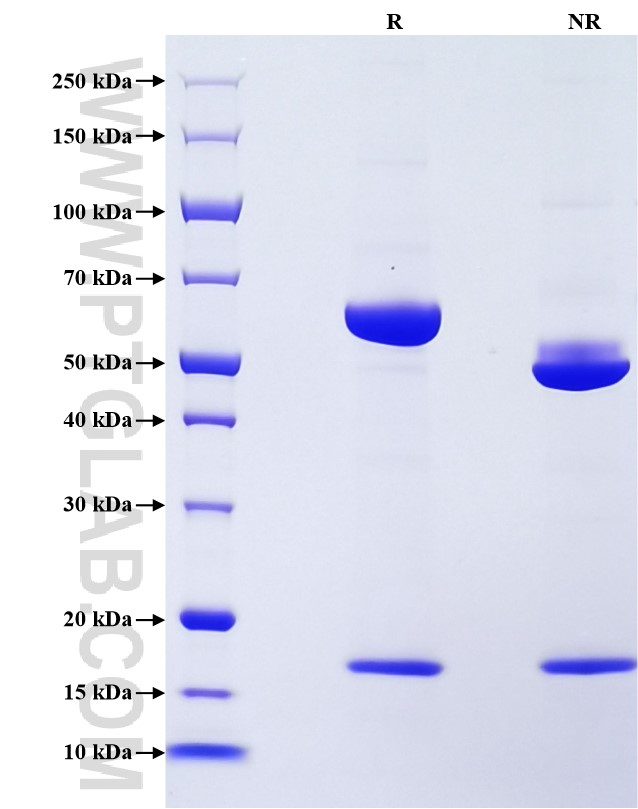Recombinant Mouse PCSK9 protein (His Tag)
种属
Mouse
纯度
>90 %, SDS-PAGE
标签
His Tag
生物活性
未测试
验证数据展示
产品信息
| 纯度 | >90 %, SDS-PAGE |
| 内毒素 | <0.1 EU/μg protein, LAL method |
| 生物活性 |
Not tested |
| 来源 | HEK293-derived Mouse PCSK9 protein Gln35-Gln694 (Accession# Q80W65) with a His tag at the C-terminus. |
| 基因ID | 100102 |
| 蛋白编号 | Q80W65 |
| 预测分子量 | 13.9 kDa (Propeptide) and 58.1 kDa (mature chain) |
| SDS-PAGE | 17 kDa (Propeptide) and 55-65 kDa (mature chain), reducing (R) conditions |
| 组分 | Lyophilized from 0.22 μm filtered solution in PBS, pH 7.4. Normally 5% trehalose and 5% mannitol are added as protectants before lyophilization. |
| 复溶 | Briefly centrifuge the tube before opening. Reconstitute at 0.1-0.5 mg/mL in sterile water. |
| 储存条件 |
It is recommended that the protein be aliquoted for optimal storage. Avoid repeated freeze-thaw cycles.
|
| 运输条件 | The product is shipped at ambient temperature. Upon receipt, store it immediately at the recommended temperature. |
背景信息
Proprotein convertase subtilisin/kexin type 9 (PCSK9) is a crucial protein governing the circulating levels of low density lipoprotein-cholesterol (LDL-C), by virtue of its pivotal role in the degradation of the LDL receptor (LDLR). PCSK9 is expressed in the kidney and lung. It is synthesized as a 72 kDa immature precursor that undergoes autocatalytic cleavage in the endoplasmic reticulum to generate a 63 kDa mature protein. The cleaved N-terminal fragment remains associated with the mature protein and is necessary for its secretion, allowing it to circulate in the blood. The ability of PCSK9 to regulate a diverse group of cell-surface proteins hinted that it might also be able to influence additional membrane proteins that are important in anti-tumour immune responses. Targeting PCSK9 to treat cancer is also attractive because two neutralizing antibodies against it, evolocumab and alirocumab, have already been approved for human clinical use to lower cholesterol levels.
参考文献:
1、Blanchard, Valentin et al. “PCSK9: from biology to clinical applications.”Pathologyvol. 51,2 (2019): 177-183. doi:10.1016/j.pathol.2018.10.012 2、Sharotri, Vikas et al. “Regulation of epithelial sodium channel trafficking by proprotein convertase subtilisin/kexin type 9 (PCSK9).” The Journal of biological chemistry vol. 287,23 (2012): 19266-74. doi:10.1074/jbc.M112.363382 3、Canuel, Maryssa et al. “Proprotein convertase subtilisin/kexin type 9 (PCSK9) can mediate degradation of the low density lipoprotein receptor-related protein 1 (LRP-1).” PloS one vol. 8,5 e64145. 13 May. 2013, doi:10.1371/journal.pone.0064145
